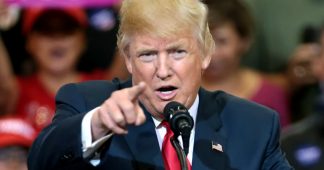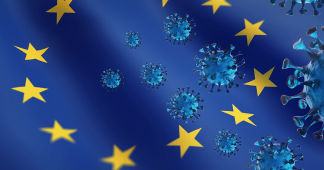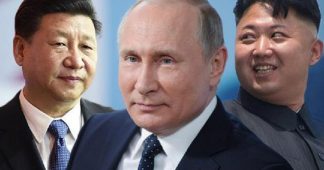By Dimitris Konstantakopoulos
This is the full version of an article already published here
If we look at what is happening in US-Russian and US-Chinese relations, in the wider Middle East, the former Soviet republics or Latin America, or the world economy and social uprisings from the USA to the Lebanon and from Bolivia to France, the current international situation bears several similarities to what happened in the years 1914, 1929 and 1939, that is, to the years when the two world wars broke out and the great economic crisis of 1929 erupted.
All the factors which led in the past to world wars, revolutions and totalitarian movements, like Nazism and huge reform projects, like the New Deal or the post-war European welfare state, are here. But they are operating in a fundamentally altered world. The Coronavirus crisis is maybe only the first of a series of more and more important disasters affecting all humanity, predicted by various scientists long ago, as a result of both the technologies developed and of the radical change in Man’s relation with nature.
We are leaving the world we know, without having solved most of its problems and contradictions, only to enter the historical era when the very existence of life on earth will be decided, probably in a matter of decades (the next decade will be more decisive, and what will follow will be the most dramatic). This reality is so enormous and so fearful that it is provoking denial or escape from both logic and freedom, among both a large part of public opinion and among the decision-makers themselves. (In the past, Erich Fromm gave us a superb description of those factors leading to the rise of Nazism in Germany, with his book “Escape from Freedom”; now we can see the same psychological mechanisms in action in Trump’s USA or in Bolsonaro’s Brazil).
It is exercising huge pressures on Logos (Logic, Reason, Science), on the capacity of human beings to love, on the fundamental human drive for freedom and even for collective survival, that is, on the main intellectual, emotional and moral capacities humanity disposes of to defend itself from the appearing threats and the ultimate danger. I don’t believe in humanity, recently said Ellon Musk, one of the most powerful people on Earth, in an argument with Gates.
In fact, only the existence of nuclear weapons has prevented, up to now, the outbreak of a world war in the form of WWI and II. But we are, without the shadow of a doubt, already living in the environment of a “low-intensity”, “slow motion” world war and also in the environment of two or three new Cold Wars (against Russia, China and Islam, in particular Iran). Since 2008 we have also been living in the environment of an economic crisis which is different in form, but still as deep as the 1873 and 1929 crises were, and now accelerated by the Coronavirus.
Unfortunately, we are still unable to fully grasp the situation, because we are afraid of the consequences we will need to draw from it. Subconsciously and emotionally, at least, we prefer to live in the much better situation which prevailed, in many parts of the world, after WWII.
This war situation is taking the traditional form of nation-to-nation conflicts, but it is also encompassing parts of society and, more and more, the fundamentals of human civilisation and nature itself in a direct way, never seen in human history.
A Crisis from the Past
In the present situation we can easily discern in action, all the fundamental factors, inherent in capitalism, which led, in the past, to the deep economic crises of 1873 and 1929 and then to Imperialism and War (in particular WWI and II and the Cold War).
In the past, such crises also provoked sharp divisions inside the dominant Western capitalist powers. WWI (and the subsequent Russian Revolution) was their result. The 1929 crisis also provoked sharply different answers. The US went to the New Deal, Germany to Nazism, France to the Popular Front, the whole situation leading to the creation of two camps inside the capitalist West: “democratic imperialism” (Churchill, Roosevelt) vs. “totalitarian imperialism” (Hitler, Mussolini). WWII, as far as the West itself was concerned, was not only a war between nations, but also a war between different alternatives and methods to fulfill the goal of world capitalist domination.
The crisis now confronting the still dominant system of Western capitalism is very deep and is threatening, subsequently, objectively if not subjectively, the domination of the holders of capital on humanity (this is what capitalism means). This danger is not reflected today so much in the rise of revolutionary movements, as happened after WWI, which provoked the Russian Revolution, or WWII which provoked the Chinese one, the national liberation struggles elsewhere and led to the establishment of the European welfare state, now being dismantled. It is not reflected because there are not the revolutionary political subjects of the past, like the Jacobins, the Bolsheviks or the Chinese Communists, for example. It is reflected mainly, for the time being, in the rise of alternative power centres, especially China but also other nations, in the revival of Russia, and in the resistance of Iran and its allies in the Middle East.
The depth of this crisis also explains the depth and the intensity of the divisions now affecting western capitalism and the very centre of imperial power: Trump vs. Biden, Huntington’s followers vs. Fukuyama, neoliberal “globalizers” vs. Neocons, Netanyahu vs. Soros. Those differences have no bearing on the strategic goal (preserving the power of Western financial capitalism in order to preserve the power of holders of capital). On this everybody agrees. The differences, as happened already during the ‘30s, have to do more with the methods, the strategies and the ideologies to attain this goal.
To use another analogy, the Empire and its “counter-revolution” has produced its “Bolsheviks” (Trump, Thiel, Pompeo, Bannon, Netanyahu etc.) and its “Mensheviks” (Obama, Merkel, Fukuyama, Soros etc.)
The project of a war against Iran, central to the Neocon imperialist project, is one of the best examples, because here the differences of the two camps are reflected in the clearest possible way. We have no sympathy for George Soros or Zbigniew Brzezinski and in particular their fanatic anti-Russian stand. But more important than condemning one or another politician is to understand in depth what is at stake in every situation. Soros and Brzezinski were (and Soros remains) staunch opponents of Iraq and projected Iran wars, while Netanyahu is one of their main architects. Obama signed a peace agreement with Iran; Trump abolished it.
The campaign against Soros during the last years is not due to his liberal ideas, his financial speculation or his hostility towards Russia. It is due to his opposition to the Iran war and has exploited in depth the general and justified suspicion towards this person and his activities and his anti-Russian stand.
The “Bolsheviks” of the Empire are not, and cannot be, more friendly than Soros towards Russia. They cannot accept the very existence of such a huge entity equipped with nuclear arms, advanced technology and a considerable degree of independence. But they possess a far larger capacity to hide their real intentions than Soros. This is not a coincidence. It reflects the more complete character of their rupture with the rationalism characterising traditional capitalism as we knew it. They don’t need to give birth to a new, even reactionary model. Their strategy is chaos and destruction of all order.
A Crisis from the Future
If there are many similarities with crises humans have confronted in the past, there is also an enormous difference: the old and known crises and war mechanisms are now operating in a radically different environment, which is putting at stake the very survival not only of human civilisation, as in the past, but the very survival of Mankind, if not of life on earth.
This reality is so enormous in its consequences that many people deny it completely or, even if they accept it intellectually, do not allow it to affect their decisions and actions. As T.S. Eliot wrote, humanity cannot afford two much reality. Albert Jacquard put it in another way, when he stated that the main difficulty in grasping reality lies in the limitations of our own imagination.
Now we do not even need any imagination. The hard facts are here, the general intuitions and theories have become algebraic equations and are now tending towards becoming arithmetical ones.
Since 1945, humanity has developed productive forces and technologies that can destroy life on the planet, but can also provide the material, technological basis of a totalitarianism without precedent in human history.
We are confronted with the danger of a nuclear disaster and the certainty of a climatic one (unless very radical measures are adopted to reverse the situation within the next ten years). To this we can add the profound disruption of Man’s relationship with nature, overwhelming urbanisation, the recourse to industrial, intensive and chemically or genetically modified agriculture, and the massive pollution of the environment and of the human body and mind. They make dangerous experiments with DNA, without any efficient control. The Internet giants are increasing every passing day their ability to widely monitor, manipulate and fool people; and all that under the threatening shadow of the Beast of Artificial Intelligence.
New technologies, accumulated knowledge and new productive forces are mostly in the hands of small groups of private oligopolies or monopolies, which control the very future of life on Earth, without any real democratic, social or international control. They are controlled by small groups of people, whose action is determined – and it cannot be otherwise in the present context – by their eternal drive for accumulation of profits and extension of their control and domination over all spheres of life. The power of those groups of people is growing inside the corpus of humanity, in the same way that cancer cells grow inside the human body, finally devouring it. Those groups of interests hold in their greedy and irresponsible hands the future of life on Earth.
In short, Mankind has begun a series of unprecedented experiments, capable of ending our life as a species within the current century, and of doing that before the usual human mechanism of learning by error has the time and the margins to correct the course of events.
This is why we need to take decisive action, to find a way to fundamentally alter our social and international system and our culture and psychology. To find it, it is no more a question of ideological or political preferences. It is a question of life or death for humanity. We cannot be sure of the origin of the coronavirus, but what we can be certain of, is that it provides us with a very mild first taste of the Hell we are preparing.
In an environment of domination (and deep decline at the same time) of the civilisation of money and finance, the new technologies and productive forces developed after 1945 are being used in a way that endangers natural and biological capital, exacerbates the economic crisis and social inequalities, both within states and on a global scale, and are threatening the very survival of humanity.
In theory, the new productive forces and technologies are enabling Man to pass from the realm of need to the realm of freedom. It is now possible to satisfy most of the reasonable needs of the present and even of a quite larger human population, something that did not happen in the past. But this would presuppose the replacement of capitalist relations of production and distribution and a radical change in the sphere of civilisation. Not only is such a thing not on the horizon today, but it is not even being put forward as a credible proposal, as an alternative vision, by any strong political force (or state).
The Realm of Ideas
As for the consciousness of Mankind, it does not seem to have made much progress since the 20th century; indeed, quite the opposite. This is particularly disturbing because the main factor which has contained world (Western) capitalism, imperialism and war has always been the opposition of the most conscious intellectuals and of the large popular masses in around the globe including the main capitalist countries (and, also, of the states born out of their revolts, like the USSR, China or the new states born out of national liberation struggles). The opposition of US and French citizens to the imperialist policies of their nations contributed a lot to the US and French defeats in Vietnam and Algeria and to the non-use of nuclear arms against Korea, China, the USSR or Vietnam. It has also delegitimised the Iraq War.
We do not have now better political thought and better tools, than during the 20th century, to tackle either economic crises or geopolitical rivalries. One huge advantage of capitalism was that it fuelled contradictions of all sorts, thus creating proper conditions for searching the truth, which lies in contradiction (Jean Jaurès). The totalitarian evolution of this system is also destroying this property.
Ideology is following and provoking mutations in material realities. Neoliberalism has destroyed every tool developed, after 1929, to control and contain the destructive activities of the financial sector (which is, in reality, more and more, the real centre of world power). Under Trump, humanity is also destroying the last remnants of arms control and, even more important, the ideology behind it.
The damage in the field of consciousness is very deep. And this field still remains the most important in human activities, because ideas dominating people tend to acquire material power (something which did not go unnoticed by the main theoreticians of war and proven true in most military conflicts, from the Napoleonic until the Iraq war).
No longer believing in the future, progress or love, many people around the globe are turning more and more to fundamental, traditional identities, such as nation, religion and family, associated with adherence to a larger group, able to provide real or imagined safety. Those identities are often very useful and even indispensable for defensive purposes, but can also have destructive consequences in some cases; at any rate, they remain of limited use in tackling the huge long- term challenges.
Nationalists often disregard the social aspect, only to discover that without tackling the social issue and defending the people it is impossible to defend their nation. They tend also to enter easily into conflicts with other nations. As for post-modern “leftists”, they tend to dismiss completely any reference to their nation, characterising this very notion as “retrograde” or even “reactionary”. But it is impossible to make politics if you quit the main level where politics is still possible to some extent, namely your nation. Besides, a progressive person cannot be indifferent to the fate of his nation, especially as it is only at this level that people have the possibility to exercise some influence on decisions and where they have a social security system. Post-modern leftists also have replaced the fight for socialism with the fight for “human rights”, understood not in a social context, but in the way Neoliberalism understands them, driven from the “ideal” of an individual without any social or moral references.
Both nationalists and post-modern leftists usually concentrate on their agendas, but there is no problem which can be addressed, without taking into account the pressure of western capitalism and imperialism on the world. To resist in an efficient way presupposes in the long run the creation of an international alliance or federation of forces struggling to fulfill another vision of the world.
Another tendency consists in pushing people to put in doubt the greater tools Man has ever developed in order to survive and become free, that is Logos, Logic, Rationalism, Science (the fact they were distorted and used to enslave and destroy people in some cases is not a reason to negate them en masse and deny their usefulness).
The paranoid situation now prevailing in the United States, the irrational conspiracy theories (which prevent people from understanding and fighting the very much existing real conspiracies), the great confusion about even the fundamental facts, is the most disturbing indication of a frightening future threatening all humanity, as the USA remains, in many aspects, one of the main “laboratories of the world”.
The shadow of the Soviet collapse
Mankind still lives largely under the state of the deep and catalytic effect of the Soviet collapse. This was largely self-inflicted, since it did not come as a result of a foreign invasion or war, but because of the accession of a large part of the Soviet elite to the West and capitalism, and the complete inability of the others to defend the regime, as they were administrators, not politicians (open politics were forbidden in the USSR, which did not abolish them, but simply send them “underground”). Of course this “suicide” would have been impossible if the USSR had not been facing deep underlying problems. Still, as far as we speak of human history, most crises can lead to a multitude of possible outcomes, dependent on the forces and the personalities present. The “objective” factors define the range of the possible outcomes, but not which one will be chosen by History.
Regardless of what one might think of the Soviet regime as it developed, the Soviet “experiment” was the most important attempt in human history to create a social organisation as an alternative to capitalism through the lower, popular and Plebian classes themselves, in synergy with pioneering intellectuals, who combined the experience of the astonishing “golden age” of intellectual Russia (1825-1932), with the experience of eighty years of European worker and socialist movements and the spirit of devotion to the ideas characterising the most remarkable representatives of the Russian intelligentsia (the world has recognised the intellectual and moral merits of those intellectuals and their special role in history by having the “international language” adopt the russian word “intelligentsia”).
This experiment began, regardless of the course it took afterwards, as a conscious effort to make Man the subject of his history and society the owner of its economy. Thus, its collapse was felt as the end of Hope and “Utopia” itself.
Only now, a few decades later, we see the first emergence of forces beginning to advance the idea of the replacement of capitalism as a strategic goal. In one way or another, it has happened with Chavez in Venezuela, with Corbyn in Britain (in spite of his compromises contributing to his defeat), and with of the Yellow Vests movement in France. It is also happening among US youth, a large part of which has supported Sanders.
Living in the very heart of capitalism, the always dominant system, many young Americans are gaining a much clearer awareness of what this system really is and they have none of the illusions their parents still want to keep. This is why, although they may not have read a single socialist newspaper or book in their lives, they respond repeatedly to opinion polls, during recent years, saying they are in favour of Socialism (and this is happening in probably the most anti -Socialist and anti-Communist country in the world). But, of course, they have to deal with a system that has used many decades of “unquestionability” to control political, journalistic and academic staff in an unprecedented way (usually by buying everybody) and has persecuted most independent intellectuals, thus destroying the very conditions permitting the elaboration of credible alternatives. That is why Youth was often forced to resort to representatives of an older age (Sanders, Corbyn) to express their opposition. It could not find convenient younger porte-paroles.
As the situation gets radicalised, the lack of satisfactory political bearers of a progressive vision is creating a void which the forces of the sui generis Far Right of our times are filling, especially after the SYRIZA fiasco in Greece, in 2015, which has been a tremendous blow to the idea of a left, progressive alternative worldwide.
Read more at http://www.konstantakopoulos.gr/12511/trump-vs-biden-in-context











